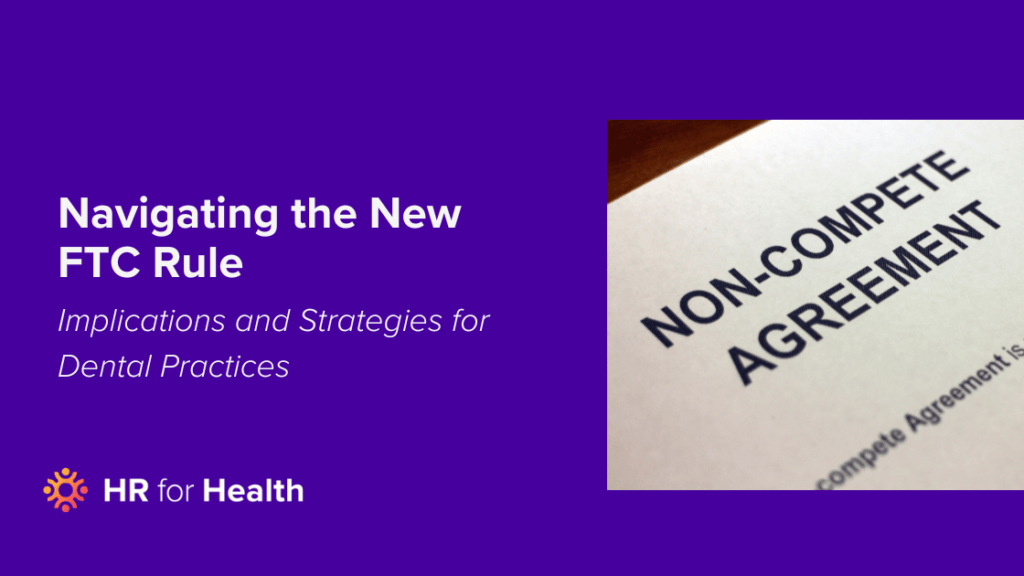The Federal Trade Commission’s (FTC) recent decision to ban noncompete agreements marks a significant shift in employment law that directly affects industries across the board, including dental practices. This new rule is set to reshape how dental practice owners manage and retain their teams. Understanding the implications of this rule is crucial for ensuring that your practice remains compliant while continuing to thrive. At HR for Health, we’re here to guide you through these changes and help you adapt effectively.
Overview of the FTC’s Ban on Noncompete Agreements
The FTC’s final rule prohibits noncompete clauses nationwide, a policy change to enhance competition and increase worker mobility. By banning these agreements, the FTC intends to create a more dynamic economy where employees can move between jobs, expected to lead to higher wages and greater innovation. This decision is based on findings that noncompete agreements often limit workers’ employment options and suppress salaries by reducing competition for skilled labor.
The rule is estimated to affect nearly one in five American workers currently bound by noncompete clauses. For the dental industry, dental practices can no longer rely on these agreements to retain their employees. The rule facilitates a greater movement of dental professionals and challenges practice owners to find new ways to maintain a stable and committed workforce.
How the Ban Affects Dental Practices Specifically
Dental practices have often used noncompete agreements to protect their patient base and proprietary information when hiring dental professionals who could potentially start their own practices nearby. With the FTC’s rule being enforced, dental practices must now reassess their approach to employee contracts and retention strategies. The inability to enforce noncompete clauses could lead to an increase in turnover, especially in competitive markets.
Furthermore, the new rule may encourage more dental professionals to explore their options, potentially leading to increased competition among local dental practices for experienced staff. Dental practice owners must understand these dynamics to navigate the changes effectively without losing their valued team members or competitive edge.
Strategies for Retaining Talent Without Noncompetes
- Enhance Workplace Culture: A strong company culture is key to employee retention. Focus on creating an environment where employees feel valued, supported, and part of a community. Happy employees are less likely to leave, even when offered slightly higher pay elsewhere.
- Offer Competitive Compensation Packages: Without noncompetes, compensation becomes even more critical. Ensure your pay rates are competitive within your market to retain top talent. Consider benefits like bonuses, profit sharing, and other financial incentives.
- Provide Growth Opportunities: Professional development is a significant draw. Offer continual education, certification programs, and advancement opportunities within your practice to keep employees motivated and committed to growing with your company.
- Foster Transparency and Communication: Regularly engage with your team to understand their needs and address their concerns. Open lines of communication can help identify potential dissatisfaction and address issues before they lead to resignations.
- Recognize and Reward Contributions: Implement a system to regularly recognize and reward employees for their hard work and achievements. Recognition boosts morale and reinforces the value each team member brings to your practice.
Legal Alternatives to Noncompete Agreements
While non-compete agreements are off the table, dental practices can take other legal measures to protect their interests. Non-disclosure agreements (NDAs) and non-solicit agreements remain enforceable and can help safeguard your practice’s confidential information and prevent solicitation of clients and staff.
In addition, structured employment agreements can include clauses that incentivize long-term association, such as loyalty bonuses or tiered benefits that accrue over time. When crafted carefully and fairly, these legal tools can help maintain stability and protect the practice’s assets without contravening the new FTC regulations.
Preparing Your Practice for the Change: Steps to Take Now
- Review Existing Employment Contracts: Audit your current agreements to identify noncompete clauses that need addressing. This ensures compliance once the rule takes effect.
- Inform Your Team: Communicate with your employees about the changes and how they might affect them. Transparency will help manage expectations and maintain trust.
- Consult Legal Experts: Work with an employment lawyer to revise your contracts and develop new strategies for protecting your practice without noncompete clauses.
- Reevaluate Your Retention Strategies: Consider non-contractual retention methods, such as enhancing workplace benefits or improving career development opportunities for your staff.
- Monitor the Impact: Monitor how these changes affect your practice and the broader market. Being proactive in your response will help you adjust strategies as necessary.
Let HR for Health Help You Protect Your Dental Practice
At HR for Health, we understand the complexities of employment law as it applies to the dental industry. Our experts are here to help you navigate the new FTC rule and implement effective strategies to protect your practice and retain your best employees. Contact us to learn more about how we can help you.
FAQs: Navigating the New FTC Rule for Dental Practices
Q1: What is the new FTC rule regarding noncompete agreements?
A1: The FTC’s new rule bans noncompete agreements nationwide, aiming to enhance competition and increase worker mobility.
Q2: How does the FTC rule affect dental practices specifically?
A2: Dental practices can no longer use noncompete agreements to retain employees, leading to potential increases in turnover and competition for skilled staff.
Q3: What strategies can dental practices use to retain talent without noncompetes?
A3: Enhance workplace culture, offer competitive compensation, provide growth opportunities, foster transparency, and recognize employee contributions.
Q4: What legal alternatives to noncompete agreements are available?
A4: Dental practices can use non-disclosure agreements (NDAs), non-solicit agreements, and structured employment contracts with loyalty bonuses or tiered benefits.
Q5: What steps should dental practices take to prepare for the new FTC rule?
A5: Review existing contracts, inform the team, consult legal experts, reevaluate retention strategies, and monitor the impact of the changes.



